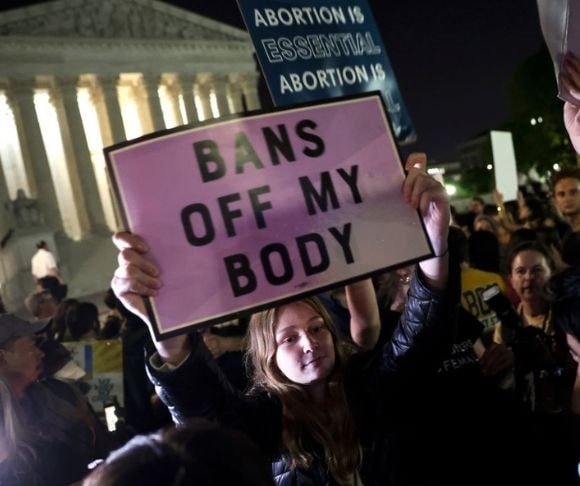Democratic Party politicians, the left-wing media, and abortion activists everywhere are in a panic. The leaked draft of Justice Samuel Alito’s opinion in Dobbs v. Jackson Women’s Health has the whole country imagining America without Roe v. Wade. To cut through the media hype and present just the facts, Liberty Nation dives deep into the state laws – past, present, and future – in the 13 states that already have so-called Roe trigger laws to ban or heavily restrict abortions as well as the 13 others that seem to be working on them. Part I addressed the first seven, alphabetically, from Alabama to Indiana. Part II examined the next seven, Kentucky through Montana. This third installment includes yet another seven states, including one – North Carolina – that falls outside the typically cited 26 but still warrants a look.
Nebraska
 In 2021, two Nebraska towns, the village of Hayes Center and the city of Blue Hill, passed local ordinances outlawing abortion entirely. Neither town has had an abortion clinic, and thanks to the new rules, neither likely ever will. In the rest of Nebraska, however, abortion is legal pre-viability for any reason and post-viability if the woman is a victim of abuse or neglect or if the medical doctor has certified in writing that the continued pregnancy is a threat to the woman’s health. Planned Parenthood offers medical abortions up to 11 weeks and surgical up to 16 weeks and six days but will refer women to “other abortion options in your area” if further along.
In 2021, two Nebraska towns, the village of Hayes Center and the city of Blue Hill, passed local ordinances outlawing abortion entirely. Neither town has had an abortion clinic, and thanks to the new rules, neither likely ever will. In the rest of Nebraska, however, abortion is legal pre-viability for any reason and post-viability if the woman is a victim of abuse or neglect or if the medical doctor has certified in writing that the continued pregnancy is a threat to the woman’s health. Planned Parenthood offers medical abortions up to 11 weeks and surgical up to 16 weeks and six days but will refer women to “other abortion options in your area” if further along.
In 2010, Nebraska became the first state post-Roe to limit elective abortions to the first 20 weeks. Last month, Democrats narrowly filibustered the Nebraska Human Life Protection Act, with the GOP falling just two votes shy of pushing it through. Now that Justice Alito’s draft opinion in Dobbs has been leaked, however, there have been calls for a special session to readdress the issue. If passed, and in the absence of Roe, this measure would recognize the unborn as people from the point of conception, criminalizing abortion at any point other than to save the life of the mother. The pregnant woman is exempt from prosecution, but anyone else involved would face a Class II felony, which could lead to a prison sentence of up to 20 years.
North Carolina

(Photo by Kevin Dietsch/Getty Images)
North Carolina is the only state here examined by Liberty Nation that didn’t make the Guttmacher Institute’s list of states certain or likely to ban or restrict abortion should Roe be overturned, and as such, falls outside of the “26 states” so often cited lately. That said, the state does have a pre-Roe law in place that has abortion advocates worried. First signed into law in 1881, the statute made abortion illegal entirely. It was then amended in 1967 to allow exceptions to save the life of the mother or in cases where the pregnancy was caused by rape or incest or if “the child would be born with grave physical or mental defect.” It’s unclear just how a grave physical or mental defect would be defined, a point that has seen the law challenged over the years. Finally, in 1973, the law was amended with the intent of making it conform with the Roe decision from earlier in the year. So, since 1973, North Carolina has prohibited any abortions past the 20th week of pregnancy unless one of the above exceptions existed.
In 2021, however, the 20-week ban was struck down by a federal judge in the Bryant v. Woodall case. Adding yet another layer to the confusion, Governor Roy Cooper and Attorney General Josh Stein are both pro-abortion Democrats and aren’t up for re-election until 2024, but the entire state legislature is up for re-election in 2022. There’s already an anti-abortion Republican majority in both houses. While the GOP doesn’t control a veto-busting majority yet, that could easily change soon. That said, it’s unclear whether AG Stein would enforce any abortion law he disagrees with, and, as explained in the Michigan section of Part II, whether he would be required to enforce it.
Currently, Planned Parenthood of North Carolina shows the abortion pill available up to 11 weeks after the beginning of the last menstrual period (LMP) and surgical procedures out to 19 weeks and six days. Where the state would stand after a post-Roe midterm election and subsequent legislative session, however, remains unclear.
North Dakota
Abortion is legal in North Dakota out to 22 weeks post-LMP, or 20 weeks gestational, with pills available up to the tenth week. An exception exists for post-viability abortions if a physician deems the pregnancy a threat to the woman’s life or a substantial risk of “grave impairment of her physical or mental health.”
If Roe is overturned, the state’s 2016 heartbeat bill goes into effect, outlawing abortions past when a fetal heartbeat can be detected – usually about six weeks. Even then, however, abortions to save the mother or to end a pregnancy caused by rape or incest will be exempt from prosecution.
Ohio

Mike DeWine (Photo by Justin Merriman/Getty Images)
Abortion is currently legal in Ohio until 20 weeks post-fertilization, or approximately 22 wees after the LMP, except for in the city of Lebanon, where local ordinances prohibit it at any point. Post-viability, there is an exception for saving the life of the mother. In 2017, the state specifically prohibited abortions if eliminating an unborn child that has or may have Down syndrome is the given reason. In 2019, Governor Mike DeWine signed into law a heartbeat bill that was almost immediately blocked in court. If Roe is overturned, however, that law would immediately go into effect, banning any abortion past about six weeks unless it’s to save the mother. Additionally, the state legislature is working on a total ban that recognizes the unborn as protected people from the point of conception. Under that law, anyone performing an abortion at any point, unless medically necessary to save the mother, would be guilty of a felony. If that’s a licensed medical practitioner, as it should be, then the person’s license is also revoked. The mother is exempted from prosecution.
Oklahoma
After the Texas heartbeat bill was allowed to take effect, Oklahoma abortion clinics saw an 800% increase in women from Texas, flooding the system. However, Governor Kevin Stitt signed into law last month a bill that prohibits abortion from the point of conception, unless necessary to save the mother’s life. Unlike similar bills in other states, this law has not yet been blocked by judicial action, and if the Supreme Court overturns Roe, it likely won’t be. Under this law, any practitioner of an abortion can be charged with a felony and face up to ten years prison and $100,000 in fines. Aborting mothers can’t be charged.
South Carolina
Abortion is available up to 20 weeks post-fertilization in South Carolina, with an exception for medical emergencies and pregnancies caused by rape or incest. There is, however, a recently passed law that prohibits abortion after the point a fetal heartbeat is detected, but it has been blocked by a federal court of appeals. Should Roe be overruled, this would likely become the law of the land. Under the South Carolina Fetal Heartbeat and Protection from Abortion Act, abortions would still be allowed at any point if the pregnancy was caused by rape or incest, if there’s a fetal anomaly, or if carrying the baby would harm the mother’s life.
South Dakota

Kristi Noem (Photo by Scott Olson/Getty Images)
South Dakota allows abortions up to the 22nd week of pregnancy. Governor Kristi Noem signed a law in March that would make it incredibly difficult to obtain a medical abortion. More concerning for abortion advocates, however, is a law passed 17 years ago. The 2005 law specifically says it will only go into effect if Roe is overturned, and it would make any abortion at any point for any reason other than to save the life of the mother a Class 6 felony punishable by up to two years in prison and a $4,000 fine. The effective date is set to the “date that the states are recognized by the United States Supreme Court to have the authority to regulate or prohibit abortion at all stages of pregnancy.” Governor Noem and Attorney General Jason Ravnsborg are both anti-abortion, and it’s expected that the law would be enforced.
Just Six to Go …
There now remain just six states to examine in Part IV: Tennessee, Texas, Utah, West Virginia, Wisconsin, and Wyoming. After 21 of what turned out to be 27 states, just a handful will actually have in place or seem poised to pass “total abortion bans” – that is, prohibiting abortion from the point of conception – should Roe be overruled, and in every case, there is an exception for, at the very least, saving the life of the mother.




